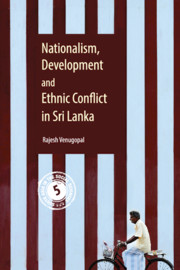Written by Dr. Rajesh Venogopal, November 2018

Publisher:Cambridge University Press
Online publication date:November 2018
Print publication year:2018
Online ISBN:9781108553414
This book examines the relationship between ethnic conflict and economic development in modern Sri Lanka. Drawing on a historically informed political sociology, it explores how the economic and the ethnic have encountered one another, focusing in particular on the phenomenon of Sinhala nationalism. In doing so, the book engages with some of the central issues in contemporary Sri Lanka: why has the ethnic conflict been so protracted, and so resistant to solution? What explains the enduring political significance of Sinhala nationalism? What is the relationship between market reform and conflict? Why did the Norwegian-sponsored peace process collapse? How is the Rajapaksa phenomenon to be understood? The topical spread of the book is broad, covering the evolution of peasant agriculture, land scarcity, state welfarism, nationalist ideology, party systems, political morality, military employment, business elites, market reforms, and development aid.
Preface
Chapter 1. Introduction
Chapter 2. Sinhala Nationalism
Chapter 3. Kulaks to Clerks
Chapter 4. The Politics of Market Reform at a Time of Ethnic Conflict
Chapter 5. Military Fiscalism
Chapter 6. The ‘Best and Last’ Chance for Peace
Chapter 7. Cosmopolitan Capitalism
Chapter 8. Sectarian Socialism
Chapter 9. Conclusions: Elites, Masses and the Rajapaksha Presidency
Bibliography
Index
Rajesh Venugopal teaches at the Department of International Development at the London School of Economics and Political Science. He works on the political sociology of development and violent conflict, with a special focus on South Asia. He writes on post-conflict reconstruction, development theory, nationalism, and neoliberalism.
——–